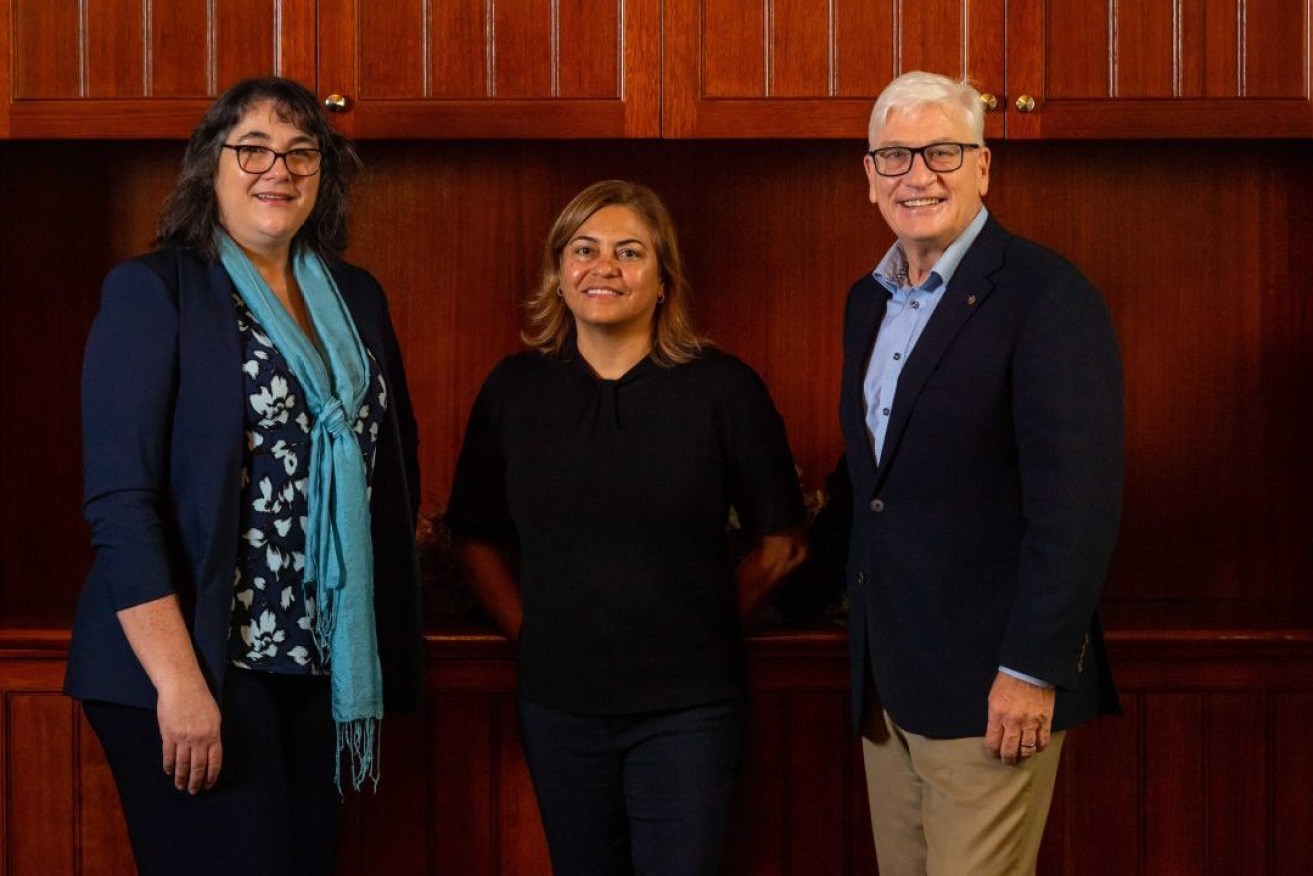
Rotary scholarships to fight Indigenous chronic disease
Two Indigenous PhD scholarships funded by Rotary will help build capacity in chronic disease prevention in Indigenous communities.

L-R Tracy Merlin, Odette Pearson, Cam Pearce. Photo: John Kruger
Celebrating 100 years in 2023, Rotary in South Australia will fund two scholarships for Indigenous PhD candidates, worth more than $250,000, as part of a newly developed major chronic disease prevention project aimed at improving the health outcomes of Indigenous South Australians.
The Aboriginal Chronic Disease Prevention Project will be delivered in partnership with the School of Public Health at the University of Adelaide and the Wardliparingga Aboriginal Health Equity Team at SAHMRI.
Two PhD scholars will be enrolled at the School of Public Health at the University of Adelaide and undertake research on culturally appropriate ways of preventing or reducing chronic disease in Indigenous communities.
They will work within these communities and in health organisations to co-develop the programs.
Public Health’s Interim Head of School, Professor Tracy Merlin, said the scholarships would help to address a “workforce deficit in Indigenous health, particularly in South Australia”.
Chronic diseases, such as diabetes, kidney disease and heart disease, are the leading causes of death among Aboriginal and Torres Strait Islander people.
Together with social determinants of health, such as socioeconomic disadvantage, they account for much of the life expectancy gap when compared with other Australians.
Merlin praised the work of Wellbeing SA and its Aboriginal Health Promotion Team, but said the “small pool” of people working in Aboriginal health and public health was “overburdened”.
The scholarship, she said, was a small step toward expanding the workforce and will give the students training in how to manage health interventions and complex projects.
“Part of this is capacity building will be helping people develop the skills to understand the research that could be done or interventions that can be rolled out, with Indigenous communities,” she said.
“The students will undertake research on culturally appropriate ways of preventing chronic disease or reducing chronic disease in communities.”
She said the partnership between the three organisations will provide the necessary foundation to ensure the project’s success.
“The project has to be grounded in the Aboriginal and Torres Strait Islander community, which is represented by Wardliparingga, but it also needs the philanthropic funding from Rotary,” she said.
“Our part is to bring the scholarship, methods and rigour to make sure the learnings are accurate and reproducible in the future.”
Both Wardliparingga and the School of Public Health will supervise the students’ research projects, with the topics dependent on the students’ own passions and the needs of the communities.
“We’ll shape the topic with Wardliparingga’s priorities, which they’ve already developed with communities in the state, and with their interests in terms of public health,” she said.
Wardliparingga Aboriginal Health Equity Team Co-Theme & Population Health Platform Lead Associate Professor Odette Pearson said the project provided a significant opportunity to engage with and respond to the needs of Indigenous communities in relation to chronic disease.
“The Aboriginal Health Equity Theme at SAHMRI in partnership with the School of Public Health at the University of Adelaide is proud to support this vital project to improve the health outcomes of Aboriginal people in South Australia,” Pearson said.
The funding initiative celebrates Rotary’s 100th anniversary, with Australian Rotary Health also a key supporter of the project.
Rotary Adelaide president-elect Cam Pearce said, with this being the major project in their centenary year, the community driven organisation is looking to leave a legacy to positively impact future generations.
“Our aim is to establish a program that not only supports the upskilling of the Aboriginal and Torres Strait Islander healthcare workforce, but promotes the development of future Aboriginal leaders with the research and clinical skills they need to help to prevent, detect and manage chronic disease,” Pearce said.
“Almost half of Aboriginal and Torres Strait Islander people live with at least one chronic disease and have complex health needs – we need to reduce the burden of chronic disease on these communities.”
Rotary in South Australia aims to raise $280,000 over the three and a half years of study to fund the project.
Applications for the scholarships are currently open with the two selections to be finalised later in the year.
Merlin said she hopes this is the beginning of something much bigger.
“We’re thinking that this would be a starting point to try and create capacity building across the board.”




